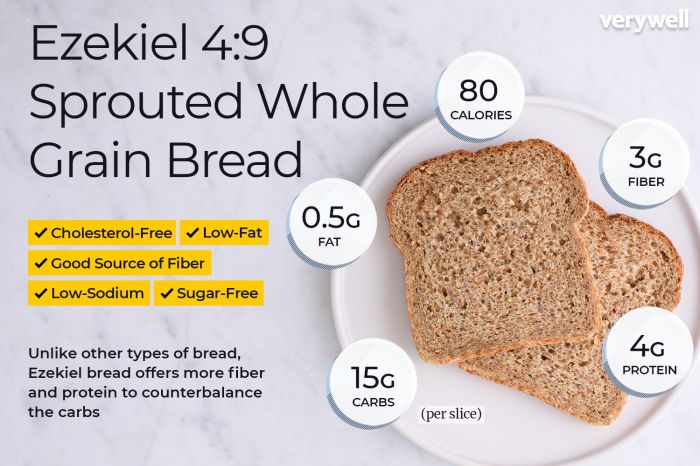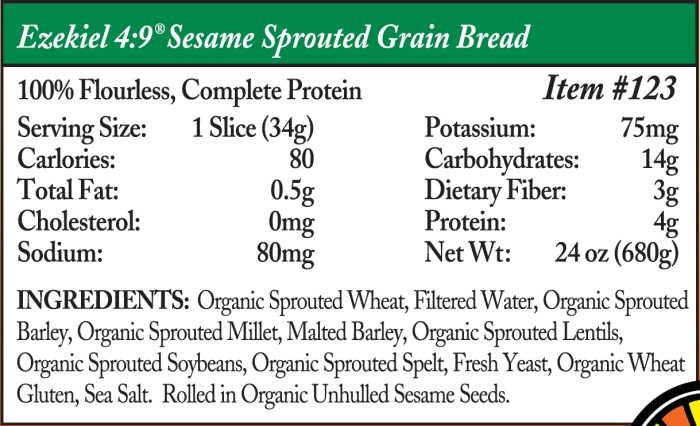Micronutrients in Ezekiel Bread: Ezekiel Bread Nutrition Facts

Ezekiel bread nutrition facts – Ezekiel bread, due to its unique blend of sprouted grains and legumes, offers a richer profile of micronutrients compared to many other bread varieties. These essential vitamins and minerals play crucial roles in various bodily functions, contributing to overall health and well-being. Understanding the specific micronutrients present and their benefits helps in making informed dietary choices.
The nutritional composition of Ezekiel bread varies slightly depending on the specific brand and recipe, but generally, it provides a good source of several essential vitamins and minerals.
Vitamins and Minerals in Ezekiel Bread
While precise quantities can vary, a typical serving of Ezekiel bread (one slice) generally contains notable amounts of several key micronutrients. It’s important to consult the nutrition label of the specific brand you are consuming for the most accurate information.
Ezekiel bread boasts a higher fiber content and protein compared to many other breads, making it a nutritious choice. For a complementary boost of vitamins and antioxidants, consider adding fresh toppings like cherry tomatoes; you can find detailed nutritional information on cherry tomatoes here: cherry tomato nutrition facts. Returning to Ezekiel bread, its nutritional profile also includes various beneficial minerals, contributing to a well-rounded dietary addition.
- Iron: Contributes to red blood cell formation and oxygen transport throughout the body. The exact amount varies, but it’s often significantly higher than in refined white bread.
- Magnesium: Essential for muscle and nerve function, blood sugar control, and blood pressure regulation. Sprouted grains contribute to a higher magnesium content.
- Selenium: A powerful antioxidant that protects cells from damage and supports thyroid function. Legumes in Ezekiel bread are a good source.
- Zinc: Important for immune function, wound healing, and cell growth. Again, the sprouted grains and legumes contribute to this.
- B Vitamins (Thiamin, Riboflavin, Niacin, Folate): These vitamins are crucial for energy metabolism, nerve function, and red blood cell formation. The whole grains in Ezekiel bread are a good source of these B vitamins.
Role of Micronutrients in Health
The micronutrients found in Ezekiel bread contribute significantly to overall health. Iron prevents anemia, magnesium supports healthy blood pressure, selenium acts as an antioxidant, zinc boosts immunity, and B vitamins are essential for energy production and various metabolic processes. A balanced intake of these nutrients is crucial for maintaining optimal health and preventing deficiencies.
Micronutrient Comparison: Ezekiel Bread vs. Other Breads
Compared to other breads, Ezekiel bread generally stands out due to its higher micronutrient content. White bread, for example, is often significantly lower in these essential nutrients because the refining process removes much of the bran and germ, which are rich in vitamins and minerals. Whole wheat bread offers some improvement, but Ezekiel bread, with its sprouted grains, often surpasses both in terms of overall micronutrient density.
Comparative Micronutrient Content: Ezekiel Bread vs. White Bread
The following table illustrates the difference in key micronutrient content between Ezekiel bread and white bread. Note that values are approximate and can vary based on specific brands and serving sizes. Always refer to the product’s nutrition label for accurate information.
| Nutrient | Ezekiel Bread (per slice, approximate) | White Bread (per slice, approximate) | Difference |
|---|---|---|---|
| Iron (mg) | 1-2 | 0.5-1 | Significantly Higher |
| Magnesium (mg) | 20-30 | 10-15 | Higher |
| Selenium (mcg) | 5-10 | 1-2 | Significantly Higher |
| Zinc (mg) | 0.5-1 | 0.2-0.5 | Higher |
| Folate (mcg) | 20-40 | 5-10 | Significantly Higher |
Glycemic Index and Insulin Response

Ezekiel bread, with its unique blend of sprouted grains and legumes, boasts a significantly lower glycemic index (GI) compared to many other bread types. This lower GI translates to a slower and more gradual rise in blood sugar levels after consumption, offering potential benefits for individuals managing blood sugar.The glycemic index measures how quickly a carbohydrate-containing food raises blood glucose levels.
Foods with a low GI (generally below 55) cause a slow and gradual rise, while high-GI foods (generally above 70) lead to a rapid increase. Understanding the GI of Ezekiel bread is crucial for assessing its impact on blood sugar control and insulin sensitivity.
Ezekiel Bread’s Glycemic Index and Comparison to Other Breads
The precise GI of Ezekiel bread can vary slightly depending on the specific recipe and testing methodology, but generally falls within the low-GI range, typically between 35 and 45. This is considerably lower than many commercially available breads, including white bread (high GI, typically above 70), wheat bread (moderate GI, often around 60-70), and even some whole-wheat varieties. The lower GI of Ezekiel bread is attributed to the presence of sprouted grains and legumes.
Sprouting increases the bioavailability of nutrients and alters the carbohydrate structure, leading to slower digestion and absorption.
Effects of Ezekiel Bread on Insulin Response, Ezekiel bread nutrition facts
The lower GI of Ezekiel bread results in a more moderate insulin response compared to high-GI breads. A moderate insulin response is beneficial for individuals with diabetes or insulin resistance, as it helps prevent the sharp spikes and crashes in blood sugar that can lead to various health complications. For individuals with type 2 diabetes, incorporating Ezekiel bread into their diet may help improve blood sugar control and reduce the need for medication.
Studies have shown that diets rich in low-GI foods, such as Ezekiel bread, can contribute to better long-term glycemic control. For instance, a study published in the journal
Diabetes Care* demonstrated a significant improvement in HbA1c levels (a measure of long-term blood sugar control) in individuals with type 2 diabetes who consumed a diet emphasizing low-GI foods.
Contribution of Ingredients to Lower Glycemic Index
Several factors contribute to Ezekiel bread’s lower GI. The sprouting process is key. Sprouting breaks down complex carbohydrates into simpler sugars, making them easier to digest, but also reduces the overall speed of digestion. Furthermore, the inclusion of legumes (like lentils and soybeans) in the recipe adds fiber, which slows down gastric emptying and carbohydrate absorption. The combination of sprouted grains and legumes creates a synergistic effect, further reducing the overall GI.
The high fiber content also promotes satiety, helping to regulate appetite and prevent overeating. This contributes to better overall blood sugar management. Finally, the absence of refined flours and added sugars further enhances its low-GI profile.
Quick FAQs
Is Ezekiel bread gluten-free?
No, Ezekiel bread contains wheat, barley, and spelt, all of which contain gluten.
How long can I store Ezekiel bread?
Properly stored, Ezekiel bread typically lasts for 3-5 days at room temperature, or longer if frozen.
Can I toast Ezekiel bread?
Yes, Ezekiel bread can be toasted. Toasting may enhance its flavor and texture.
Is Ezekiel bread suitable for weight loss?
Its higher fiber and protein content can contribute to satiety, potentially aiding in weight management as part of a balanced diet and exercise plan. However, portion control is still crucial.
Where can I buy Ezekiel bread?
Ezekiel bread is available in many health food stores, some supermarkets, and online retailers.
